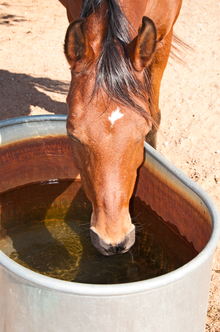With the arrival of summer, temperatures are soaring in many parts of the country, and it's important to remember how crucial water is to keeping horses healthy. Always ensure your horses have access to fresh, clean water at an appropriate temperature, and ensure they're drinking the fluids provided.

Importance of water in horse health
As spring progresses into summer, most horses are engaged in a higher level of activity and lack of water consumption during these times of greater activity can lead to dehydration.
If the horse has the advantage of daily grazing on fresh pasture grasses during the summer months, he will be able to consume water through the intake of grasses, which contain large amounts of water. This could reduce the desire of the horse of obtaining water through drinking.
As spring arrives and progresses into summer, most horses are engaged in a higher level of activity including pleasure riding, trail riding, showing, farm and ranch work. Lack of water consumption by the horse during these times of greater activity can lead to dehydration.
Dehydration in horses is an extremely serious situation and can occur during strenuous exercise, stressful situations, or in cases of bouts of diarrhea. The lack of water can include the lack of electrolytes. Electrolytes include the minerals sodium, chloride and potassium and the lack of electrolytes can lead to kidney failure in the horse, if the horse is not rehydrated quickly.
Horse owners can suspect dehydration in their horse by recognizing the signs: sunken eye or dullness, lethargy, dry skin and mouth, drawn up flanks, depression or excessive thick saliva.
A simple, but not always accurate way to judge dehydration in horses is to conduct a simple skin pinching test. Pinch up a fold of the horse’s skin and then release it. Skin should immediately return back into its natural position. If the skin remains in a ridge from two to five seconds this could be a sign of mild dehydration.
The longer the skin remains in a ridge can determine the severity of the lack of water in the horse’s system. Skin that remains in a ridge appearance for ten to fifteen seconds is the alert for immediate veterinary assistance, for the skin is demonstrating severe dehydration signs.
Offer the horse cool fresh water often during strenuous activities. If the horse is at a location where the drinking water does not have the same taste as the home water the horse may refuse to drink. To make sure your horse will drink water that may taste different, while traveling to an event, try flavoring the home drinking water for a few days prior to the journey with Gatorade or apple juice to accustom the horse to the flavor.
For the convenience of the horse owner prepared powdered electrolyte packets, flavored or unflavored, can be adding to drinking water to replenish necessary items.
According to the Merck Manual of Horse Care,"The minimal maintenance daily water requirement of a sedentary adult horse in a thermo-neutral environment is 5 L/100 kg body wt/day, assuming the horse is consuming at least 1.5% of its body weight in feed dry matter.
"However, a 500-kg horse will usually drink 21–29 L of water per day when fed a mixed hay/grain ration or pasture. If fed only dry hay, water intake will almost double. Lactation or sweat losses also increase the needs by 50–200%.
"A 500-kg horse exercising for 1 hr in a hot environment will need to drink 72–92 L of water to replace sweat and evaporative losses. Lactating mares need 12–14 per 100 kg body wt to sustain good health and milk production.
"Unlimited free access to clean water is usually recommended, although horses can easily adapt to only periodic access throughout the day if the amounts offered during the watering sessions are not limited. Inadequate water access will reduce feed intake and increase the incidence of impaction colic, anhidrosis, and other metabolic disorders."
As a horse owner, consider these basics of equine water consumption:
- The feed consumed can determine the amount of water required:
- Fresh pasture has between 60-80% moisture and can provide a large amount of the horse's water requirements when grazing.
- Hay and grain are very low in moisture, causing horses to drink more water.
- Higher levels of protein and sodium in the diet increase the horse's water requirement as urinary volume increases.
- Temperature and humidity - Ambient temperatures above 85°F will increase a horse's drinking frequency and volume. Colder temperatures (below 45°F) can reduce a horse's water consumption
- Health status - Horses with excessive water losses from diarrhea require more water per day.
- Physiological stage - Type of physical activity performed can affect the amount of water a horse needs. Performance horses should be allowed access to water often while traveling and competing.
